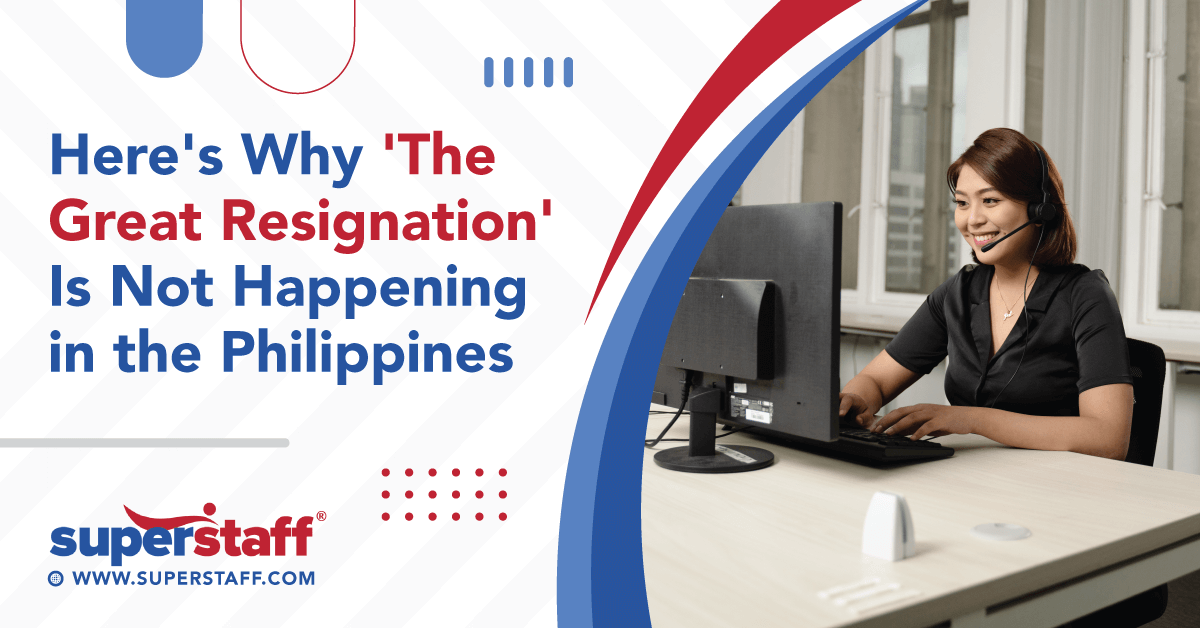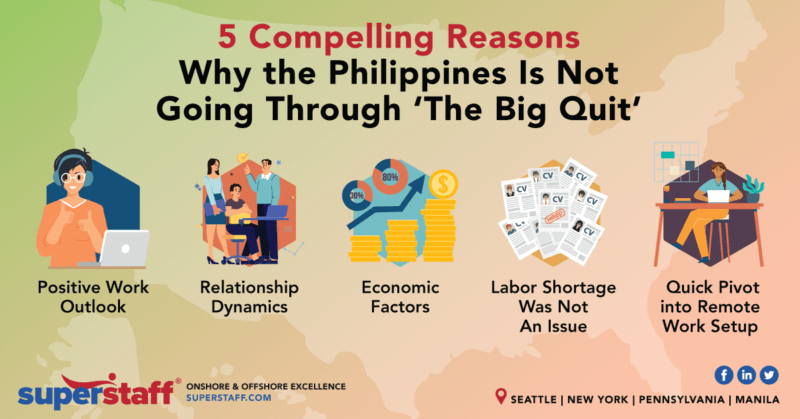
Discussions abound surrounding “The Great Resignation.” The unprecedented phenomenon that had employers digging deep into their pockets ended 2021 with:
- A near-record 10.9 million job openings and 5.9 million separations
- A two-decade-high increase of 4% on wages and benefits
- A heightened rate of burnout that contributed to a 16% rise in resignation among C-level executives
Indeed, “The Big Quit” is as global as the pandemic. However, some countries are not as affected as others. Case in point: The Philippines.
Is the Philippines Experiencing “The Great Resignation?”
Amid the growing worker shortage in other parts of the globe, the Philippines managed to maintain a steady labor market. The latest available data show that the employee turnover rate in the National Capital Region dropped from -3.1% in the first quarter of 2021 to -1.2% in the second quarter of the same year.
The Philippine government’s ongoing rural development efforts to decongest the country’s capital are also expected to further boost the recovery of the labor market. In Pampanga, the country’s booming business district, major infrastructure projects are underway. These initiatives attract more members of the private sector to invest heavily in the province, a sign that many businesses anticipate more workers. For the BPO industry, the developments mean more headquarters for offshoring services will rise soon.
And while prolonged pandemic movement restrictions have resulted in increased separations in the country, the International Labor Organization expects the Philippines’ unemployment rate to return to the pre-pandemic level by 2023.
5 Compelling Reasons Why the Philippines Is Not Going Through ‘The Big Quit’
#1: Filipino Employees Maintain a Positive Work Outlook
Among the often-cited reasons why people are quitting their jobs is the desire to find deeper meaning and fulfillment in what they do. The professor who coined the term “The Great Resignation,” Anthony Klotz, called it a pandemic epiphany.
Of course, Filipino workers are not immune to the existential crisis brought by COVID. But one thing about most Filipinos is that the importance of caring for their family is deeply ingrained in their value system. This trait is behind most employees’ high regard for work.
Many see work primarily as a means to provide for the needs and wants of their loved ones. Many Filipinos tie their jobs with dreams of a better future for themselves and their children, parents, and other family members. This outlook makes it easier for Filipino employees to find purpose and fulfillment in what they do.
#2: Relationship Dynamics at the Workplace Help Mitigate Employee Turnover
How much do Filipinos value strong family ties? It bleeds through their relationships with their co-workers.
In the Philippines, it is common to see a little family structure at work. This dynamic helps employees feel more engaged in the workplace—another factor proven crucial in curbing employee turnover. Research shows that:
- People who have friends at work have a higher level of satisfaction and engagement.
- Those who have best friends at work are seven times more likely to be engaged with their jobs.
- Employees perceive their colleagues as the top contributor to workplace satisfaction.
#3: Economic Factors Prevent Employees From Resigning Without a Backfall
While the Philippines has a social security program that provides unemployment benefits, it is not as comprehensive as the U.S. This reality makes it challenging for Filipino employees to quit their jobs without new prospects, especially since the pandemic has slowed the country’s economy.
The situation, however, does not mean that Filipino workers tolerate toxic work environments. Many question and rethink their work choices, too. However, citing the practical reasons mentioned above, they do not simply leave the workforce altogether.
Many of those who left their previous jobs during the pandemic resigned to look for better opportunities elsewhere.
According to the Philippine Statistics Authority, about 25% of the country’s separations in the second quarter of 2020 were voluntary, and among the reasons cited by employees was that they were being hired by another company. Meanwhile, 65.8% of employer-initiated separations in the same period were due to business conditions brought about by the pandemic.
Fortunately, COVID-19 cases in the country are on a continuous decline. To stimulate economic activity and growth, the government has started lifting numerous restrictions. Companies are now encouraged to resume in-office operations and allowed to operate at full capacity. These positive developments are expected to further bring down the country’s unemployment rate to the pre-pandemic level.

#4: Labor Shortage Was Not an Issue Even Pre-Pandemic
Worker shortage prompted neck-deep competition for talents in the U.S. However, in the Philippines, the competition is tougher on the job seekers’ side even before the pandemic.
As mobility restrictions ease, analysts foresee a significant increase in the country’s labor force, especially as more new graduates become members of the sector. Take a look at the following data:
- Labor participation in the Philippines rose from 62.6% in October 2021 to 64.2% in November 2021.
- Larger labor force participation prompted the unemployment rate to increase from 6.5% in November 2021 to 6.6% in December 2021.
- Unemployment among aged 14 to 24 is expected to rise between 20.5% to 22.5% in 2022.
To increase the employability of Filipino workers, the government has implemented various retraining and retooling programs. These initiatives help further equip the country’s workforce with skills that suit the future global work landscape.
#5: Employers Were Quick to Pivot Into a Longer Remote Work Setup
Companies in the U.S. have held fast to the idea that in-office work will soon resume, driving a significant number of remote workers to join “The Big Quit.” Recent data support the inference that U.S. employees wanted to continue working remotely—55% said they would consider resigning if asked back to the office.
The same is true for the Philippines and other Southeast Asian countries. More than 80% of employees in the region prefer to work remotely full-time, even after the pandemic. Given that many companies in the Philippines support thousands of small to large-scale businesses offshore, members of the country’s BPO sector have adopted business continuity plans that support longer or even permanent work-at-home setup.
Read More: 5 Reasons to Choose Customer Service Outsourcing in the Philippines
Philippines Remains the Top Talent Source for US Companies
The Philippine workforce has a lot to offer—quantitatively and qualitatively—to help U.S. companies cushion the impact of “The Great Resignation.”
The country can also help U.S. businesses step into the phase of “The Great Recovery.” By outsourcing to the Philippines, companies can expand their talent pools with globally competitive professionals—highly sought for their impressive skills, attitude, and work ethics.
SuperStaff: Helping U.S. Businesses Outsource to the Philippines Since 2009
The global business landscape has been rapidly evolving even before “The Great Resignation” prompted massive labor climate disruption. Then and now, SuperStaff has been providing enterprise-level outsourcing solutions that enable businesses in the U.S. and other parts of the world to scale as needed. We have been behind the successful expansion of numerous outsourcing partners for more than 13 years.
Aside from our headquarters in the central business district of Makati, SuperStaff has offices in Angeles and Clark in Pampanga, a highly urbanized province fast transforming into a vibrant megalopolis. Our presence in these key cities in the Philippines enables us to provide you with the strategic advantage to respond to your evolving business needs.
Learn more about our offshoring solutions by reaching out to one of our human capital strategists.







